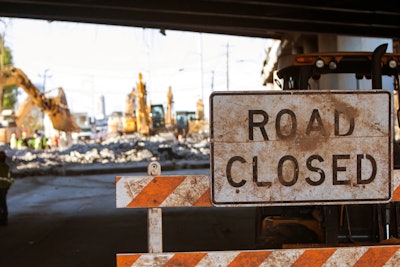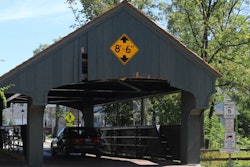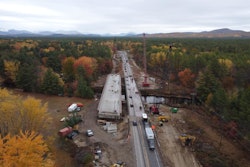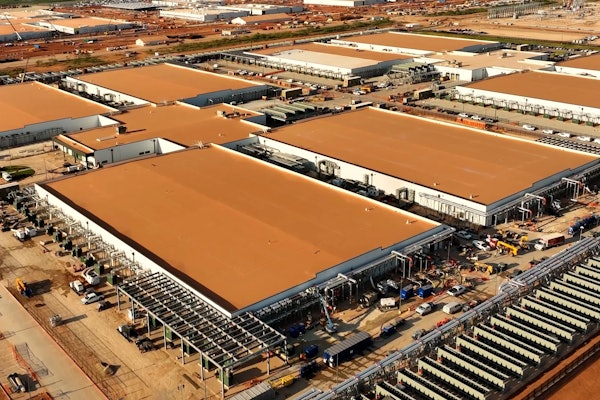
A Republican proposal announced April 22 calls for spending $568 billion over five years on the nation's infrastructure – about 75% less than President Joe Biden's plan.
Sen. Shelley Moore Capito of West Virginia said it was "the largest infrastructure investment Republicans have come forward with." It focuses on what is typically considered infrastructure, such as roads, bridges, transit, water and sewer. It also calls for shoring up any deficits in infrastructure trust funds, such as the Highway Trust Fund.
"We're ready to sit down to get to work on this," she said at a press conference with three other senators who helped craft the "Republican Roadmap."
The plan would not increase the gas tax, they said. Instead, they called on the plan to be funded by user fees on electric and hybrid vehicle owners that don't pay as much or any gas tax, repurposing unspent money from Covid-relief legislation, and allowing state funding matches for infrastructure with the additional Covid-relief funding the states received. The proposal would leave intact the 2017 tax cuts for corporations, which Biden wants to partially roll back to pay for his $2.25 trillion plan.
Sen. Pat Toomey of Pennsylvania said the 2017 tax cuts led to the strongest economic recovery of his lifetime, before the pandemic hit. He added that Biden's plan included "all kinds of things that have nothing to do with infrastructure," which should be discussed separately.
Sen. Roger Wicker of Mississippi also criticized the Biden plan for devoting only "6% to roads and bridges" and too heavy a focus on electric vehicles and other initiatives such as "environmental justice."
The Republican plan would more than double the amount in the Biden plan slated for roads and bridges. However, Biden's plan seems to be additional funding to the annual amount approved by Congress for roads and bridges; whereas, the Republican plan's amount includes the annual appropriation. That could mean the Biden plan ultimately leads to more funding over five years for roads and bridges than the GOP plan.
The senators stressed that traditionally infrastructure has been a bipartisan issue and said they were ready for the work to begin in the various committees to reach a compromise.
"The American people want to see us working together," Capito said.
A Biden spokesperson told reporters the GOP plan was a legitimate starting point, according to The Hill. "It’s the beginning of a discussion," said Jen Psaki, Biden press secretary. "And the next steps will be conversations at the staff level, conversations between senior members of our administration, members of Congress, appropriate committee staff through the course of next week, and then as I noted the president will invite members down to the White House. But there are a lot of details to be discussed."
Side-by-side comparison
Here's a rough breakdown of the Republicans' proposal and how it compares to Biden's American Jobs Plan:
Roads and bridges
GOP: $299 billion (would include the annual federal highway appropriation)
Biden: $115 billion (reportedly would be on top of the annual highway appropriation)
Capito said the Republican's proposed amount would include increasing annual highway funding, which is set to expire in September. The American Road and Transportation Builders Association estimates the GOP plan would add an average $13 billion in annual highway funding over five years.
It appears that the amount in the Biden plan is in addition to the annual highway funding. A Roll Call article in March quoted a USDOT official saying the $115 billion would be in addition to surface transportation reauthorization. The Washington Post also reports that the amount is in addition to the annual appropriation.
Biden's plan also calls for spending that could fall under the road category, such as $20 billion to help reconnect low-income and minority neighborhoods that have historically been disrupted by transportation projects built through their communities, and $25 billion to “support ambitious projects that have tangible benefits to the regional or national economy but are too large or complex for existing funding programs.”
Public transit
GOP: $61 billion
Biden: $85 billion
Rail
GOP: $20 billion
Biden: $80 billion
Water and sewer
GOP: $39 billion (includes $14 billion for water storage)
Biden: $111 billion
Ports and inland waterways
GOP: $17 billion
Biden: $17 billion
Airports
GOP: $44 billion
Biden: $25 billion
Broadband
GOP: $65 billion
Biden: $100 billion
Safety
GOP: $13 billion (to be split among the Federal Motor Carrier Safety Administration, National Highway Traffic Safety Administration and the Pipeline and Hazardous Materials Safety Administration)
Biden: $20 billion (Biden's plan specifically mentions road safety.)
Where the plans drastically depart
Biden's plan calls for $1.7 trillion more in spending, which includes the following:
- $174 billion for electric vehicles, including charging stations, helping U.S. automakers, boosting battery production, and tax rebates and incentives for buying American-made EVs.
- $400 billion for expanding access to home- or community-based care for the elderly and disabled.
- $300 billion for manufacturing, with $50 billion toward critical goods, $50 billion toward semiconductor production and $30 billion toward preparing medical manufacturing for future pandemics, including shoring up the nation’s strategic stockpile. This funding also includes $46 billion for federal purchases of electric vehicles, charging ports and electric heat pumps in an effort to reach Biden’s goal of net-zero emissions by 2050.
- $213 billion for affordable housing, which includes new construction and renovations for housing for those with low to moderate incomes. The goal is 2 million affordable homes and buildings.
- $180 billion for research and development.
- $100 billion to construct and upgrade public school buildings.
- $100 billion for training workers and apprenticeships, particularly in underserved communities.
- $25 billion to upgrade child-care facilities.
- $18 billion for Veterans Administration hospital improvements.
- $16 billion for creating hundreds of thousands of union jobs to plug orphaned oil and gas wells, improving the electrical grid and restoring and reclaiming abandoned coal, hard rock and uranium mines.
- $12 billion for community college facilities and technology.
- $10 billion for a new Civilian Climate Corps that would create jobs paying union wages for preserving public lands and waters, among other climate-related projects.
- $10 billion for modernizing federal buildings.
- $5 billion to clean up and redevelop Brownfield and Superfund sites.
Reaction
Reaction among construction-related groups was somewhat subdued to the GOP plan in comparison to Biden's proposal, which resulted in some objections due to its calls to increase corporate taxes and an emphasis on union labor.
On the whole, though, the construction industry is hoping this will finally be the year for a major federal infrastructure package and viewed the Republican proposal as another important step in the legislative process.
Here are some comments from various trade associations on the GOP plan:
From Dave Bauer, CEO of the American Road and Transportation Builders Association:
“President Joe Biden jumpstarted the transportation infrastructure debate with the release of his American Jobs Plan. Today’s proposal from Senate Republicans illustrates the desire to address the nation’s mobility and economic competitiveness challenges is broad-based and real. A wide-ranging federal infrastructure renewal initiative is much needed and long overdue."
From the Associated General Contractors of America:
"The framework put forth by Republican senators shares significant similarities with President Biden’s American Jobs Plan and shows that there is a very real pathway for enacting transformational infrastructure legislation. We are very encouraged by this process to produce a bipartisan proposal."
From Jean-Louis Briaud, president of the American Society of Civil Engineers:
"Much like the American Jobs Plan, this new proposal includes critical funding to repair and modernize the transportation sector, but also addresses drinking water and wastewater needs, ports and inland waterways and improving broadband access. The Covid-19 pandemic decimated revenues for airports, transit agencies, water utilities and state departments of transportation, making the need for a strong federal partner greater than ever."
Jim Tymon, executive director of the American Association of State Highway and Transportation Officials:
“Today, Senate Republicans have put forward a proposal that recognizes the value of using proven existing programs and increasing funding for infrastructure over current levels. But this is only one further step in the process. We look forward to Republicans and Democrats working with the Administration to reach a bipartisan agreement that increases investment and modernizes our nation’s infrastructure as soon as possible.”
Correction: A previous version of this story misstated the percentage reduction of the GOP proposal compared to the Biden plan.










